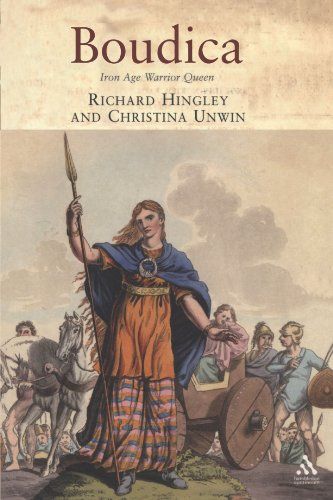
Last night I was engrossed in watching the final episode on the BBC historical documentary The Celts but was taken aback when just after taking us through the story of Boudicca’s revolt against Rome I was hit with the following dialogue of the program’s two narrators:
The Celts
(Season 1 Episode 3)
location: 52:45 to 54:35
Professor Alice Roberts: The defeat was total. Boudicca’s entire army was wiped out. According to Tacitus only 400 Romans were killed that day compared with 80,000 Celts. The last great Celtic rebellion was over.
Neil Oliver: We’re told Boudicca survived the battle but poisoned herself shortly after, and with her died any hope of another Celtic uprising and an end to Roman rule in Britannia.
Alice Roberts: Boudicca disappeared from history and entered into national mythology, a martyr to the idea of a free Britain. But while the Celtic rebellion was certainly real can we be absolutely sure that Boudicca played a part in it or even existed? No archaeological evidence of Boudicca herself has been found.
Neil Oliver: Then, in the Spring of 2015, in Gloucestershire, an ancient gravesite was discovered dating to the Roman occupation of Britain. In amongst the human remains was a gravestone and on it was carved the name Bodicacia. Underneath the stone lay a skeleton. Could this finally be evidence of Britain’s great warrior queen? But the bones belonged to a man. And the myth of Boudicca continues to this day.
Ever since my middle years of primary school when we were taught of the famous feats of “Boadicea” [the Latinized form of her name] and her chariots it has never occurred to me to question the historical existence of Boudicca (Boudica) [the current “correct” forms representing her name].
So this morning I tracked down Alice Roberts’ book The Celts to see if she has given us names of historians who have raised the question of Boudicca’ historicity. My interest (you may have guessed) is in the methods used by historians either side of the question to see if they can throw any light on the discussion of prominent biblical characters, such as, say, to take one at random, Jesus. No luck. But AR did express her own positive opinion with respect to Boudicca’s existence:
. . . . As for Boudica herself, the historians are remarkably inconsistent. We are told that the revolt melted away; that Boudica fell ill and died; that she poisoned herself. In the end, we simply can’t be sure of the fate of the last warrior queen of the Celts. . . .
. . . .
But what about individual characters? Again, how far can we trust the classical accounts? Some authors have even suggested that Boudica – this vision of a powerful woman who threatened Caesar – was a Roman invention, a bit of propaganda. But most scholars accept that she did exist. ‘I believe she was real,’ Barry Cunliffe told me. ‘It just wasn’t the sort of thing the Romans did – to invent characters. It doesn’t fit at all with what we know about Roman historical writing.’ And the Romans probably found her a surprising character. They were used to powerful women – the wives and mothers of the emperors held great power – but the potential for a woman to become a war leader represented a stark difference between Celtic and Roman society. Boudica wasn’t the only warrior queen that the Romans would have been aware of. In the north of Britain, in the mid-first century BC, Queen Cartimandua led a confederation of Celtic tribes which were loyal to Rome – until she was ousted by her ex-husband, Venutius. This ambivalence towards gender, providing the possibility for women to become leaders of men and to achieve the highest status in Celtic society, also seems to be reflected in the chariot burials of Yorkshire: women as well as men were treated to such elite funerary rites. So there seems no reason to doubt the existence of a powerful female Celtic hero. Boudica may have been embellished, with various attributes added to her, but this tends to be the case for any war leader – the stories of Che Guevara walking on water providing a more recent example. The picture we get is a ‘constructed Boudica’, but the nucleus is real.
“No reason to doubt”. Hoo boy! Where have we heard that line before. But I can forgive Alice Roberts because she is not a historian and is here deferring to a historian’s opinion. Unfortunately she leaves no trace in the book based on the TV series of those historians who have apparently questioned the historical reality of Boudicca. So I cast the Google net wider. Most sites assumed her historicity; some sites emphatically stated that she did exist and any suggestion otherwise was essentially daft. No-one (scholars, even) questioned her existence, one site said.
A key reason, surely a very strong one, for “not doubting” the Roman accounts is that the first historian to leave us a record, Tacitus, was a young boy at the time of Boudicca’s rebellion; but more significantly, his father-in-law was a governor in Britannia after the rebellion was crushed so would have had knowledge of the events and have been able to inform Tacitus
But I kept looking and found a few that were more open to the question such as: Continue reading “Doing History: How Do We Know Queen Boadicea/Boudicca Existed?”
